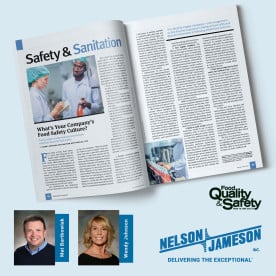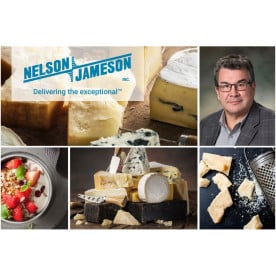For the next three months, “The Wide Line” blog will feature a series of columns authored by Dan Strongin, a well-known name in the food industry.

You are a professional buyer, and I can't possibly know anything more about your particular job or your particular business than you do. I also know that most likely you didn't come to this site to only read this blog.
We are both professionals. I want to make these posts truly useful to you! You won't find fancy marketing language here listing the benefits of buying from Nelson-Jameson, though there are many. You get enough of that sort of language in the market today and I am at that glorious stage in life where I only agree to do things if I believe in them. And I believe in Nelson-Jameson. I have reason to, but more on that later.
For the next few weeks, I'm going to pull no punches. If what I write upsets you, don't let it! I will challenge, needle, and push you. No matter how much anyone knows, you can't grow without pulling out some dead wood, and you can’t evolve without killing some sacred cows. And that never feels good until after the fact.
I may not know about your particular job as a buyer, but for more than a couple of decades I was a buyer, a good one, and in a few different industries. I know more than most about the supply chain, because I have spent years studying it, and what I know about price, true cost, and inventory can make your company a lot of money.
So strap on your seat belts, put on your crash helmets, and get ready, because, like it or not, we're going to be talking about statistics. Statistics!?! Feeling sleepy? Don't worry...I am not talking about abstract statistics and squiggly symbols, but practical statistics, and statistical thinking, because everything about effective buying has to do with prediction, probabilities, and lowering exposure to risk.
This week though, I would like to focus on a terrible syndrome I suffered from when I was a beginning buyer called the myopia syndrome.
At that time, the only thing I looked at were the individual items suppliers sold. If I needed an item, and they were the only ones who had it, I bought it no matter what the price. If they were one of a handful of people who had it, I would buy from the one with the lowest price. It was not until many years on the job that I took on a more holistic approach.
Now before you say, “what a hack!” Remember, that was a different era. At that point, we didn't suffer from information overload. The computer, improvements in logistics, free trade, and world markets, along with pretty complicated regulations, certifications, and audit requirements changed all this. As all of you know better than I, there always seems to be more information, more products, more requirements, and less time.
And the old-fashioned buyer who only cared about paying the lowest price, would be lost in today's increasingly complex world. Because the price you pay for an item is not the only cost. The time you need to learn about all the possible choices out there isn't there, and the ever-increasing cost of everything else means that smart operators have to learn to partner with their suppliers to cut through the noise. They need to focus as many resources as they can on what they do best, which for a buyer should be effectively managing their inventory dollars. As we will see in the coming weeks, the faster the flow of raw materials to products sold, the greater the profit.
When I finally overcame my myopia syndrome, I realized that suppliers sold so much more than just individual items. To thrive, I needed to understand their whole package including the following: the sum total of all the items, all the categories, all the services and how they related to each other, and most importantly, their people.
I could no longer depend on chance to find out everything they had to offer, and somehow had to make the time to really study how they might help me and my company overall. This moment of clarity came about when I started to do competitive cuttings, comparing one product from one supplier with an equivalent product from another supplier, to know which would work best for me. Ironically, a larger business I was working with acquired another one of the suppliers I was using at that time. They both carried the exact same product at the exact same price, but when we started to test the product, to our surprise, though they were the same: same label, same package…the product from the smaller supplier was of much better quality. How can that be?
When I looked into it further, the root cause was that the former management still ran the smaller company, and being a family business, they treated their people with respect, and their employees liked working there. At the larger company where people hated working, goods would stay on the dock and in the sun longer, no one watched the thermostat, items were stashed in the wrong places, not rotated properly, beat up and abused, just like the people who worked there.
I realized, to evaluate a supplier properly would require much more than just checking out the prices. I started looking into every aspect of the company, everything they sold, everything they provided, who owned them, what their minimum requirement was, the quality of goods when delivered, quality of service, frequency of delivery, how responsive they were, and how much they knew about their product so they could help me use it more effectively. Finally, I kept a keen eye out for a company interested in more than just trying to get me for a buck. They needed to be watching my back.
So let’s talk a little bit about the Nelson-Jameson family: great people! Let’s look at who runs the company: Jerry, Carl, Murray, and all the rest from the end of the dock to the executive offices; you tell me, what kind of people are they?
Let’s also talk about the categories that they can help you with: ingredients, packaging, laboratory supplies, quality assurance, quality control, processing and flow control, safety, sanitation, personnel, and maintenance. Take a load off your mind!
As you’ll see, in a future post, what you could save just by allowing them to help you mitigate the risk of excess inventory, will more than pay for any items where they may not be the low price leader. Don’t get upset with me if I point out that it’s not the money you pay item by item, but the money you put in the bank at the end of the day that matters. I know you know that, but I had to say it.
But it doesn’t stop there: they possess the expertise to know how to use their products economically. When you're buried in paperwork keeping up with the latest audits, and your required quality management system, you can count on them: they have someone trained, on staff, to help you. Need rapid delivery? They have a warehouse near you, and a state of the art computerized warehouse management system.
As I said at the beginning, I can’t possibly know as much about your particular job as you, but I know a lot about how to manage companies, and in today’s fast-moving, wildly competitive environment, the companies that thrive long term are those that can stick to what they do best, and partner with other trusted suppliers to fill the gap. In a world of limited resources like time and money, you simply can’t do everything yourself, and do it well.





